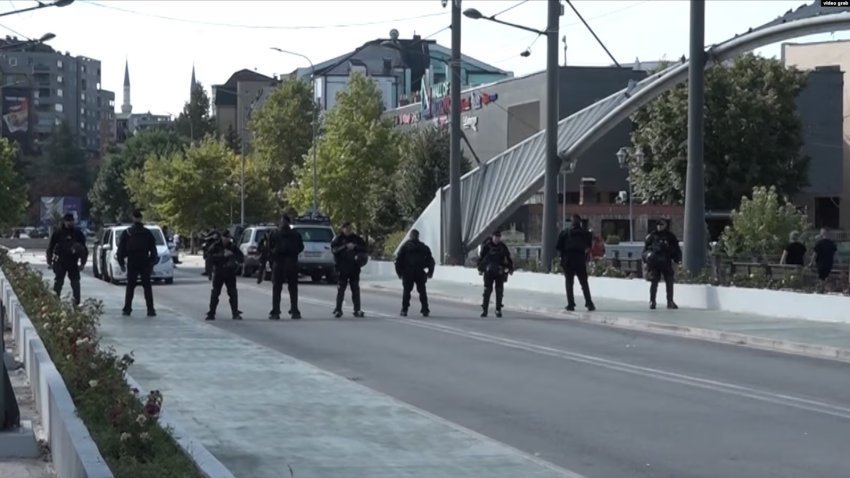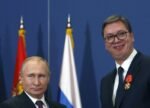NATO-led peacekeeping forces in Kosovo said on Saturday that they are prepared to address any developments related to security while reaffirming their support for talks aimed at normalizing relations with Serbia, facilitated by the European Union.
In a written response to Voice of America regarding the increased presence of peacekeeping forces on Saturday at the main bridge over the Ibër River in Mitrovica, KFOR stated that this “is part of the periodic training that KFOR conducts to test its action procedures and maintain the highest operational standards.”
KFOR further stated in their response that they are “monitoring the security situation in northern Kosovo and remain vigilant. They are determined to take all necessary measures to continue fulfilling the mandate given by the United Nations to respond to any further developments.”
During the day, KFOR’s Deputy Commander Federico Bernacca met with representatives of the Serbian List, a day after Kosovo authorities shut down the parallel Serbian municipalities in the north, in an operation that was immediately criticized by the United States and the European Union and is likely to heighten tensions with neighboring Serbia.
Mr. Bernacca, according to a press release, emphasized KFOR’s commitment “to contribute to security and stability for all citizens of Kosovo,” while reiterating KFOR’s support for the Kosovo-Serbia normalization talks, facilitated by the European Union.
On Friday, Kosovo authorities announced that they had “closed illegal parallel institutions of local self-government, which were operating under directives from Serbia, violating the constitutionality and laws of the Republic of Kosovo.”
Kosovo considers the municipal institutions appointed by Belgrade to be illegal.
The closure of the parallel Serbian institutions was foreseen in the 2013 agreement on the normalization of Kosovo-Serbia relations, but its implementation has stalled.
At the beginning of August, the authorities closed the Serbian Post in the north and unveiled plans to open the main bridge over the Ibër River in Mitrovica for vehicle traffic, amid criticism from the West.
U.S. Assistant Secretary of State for European Affairs Jim O’Brien stated that “the United States is concerned by the ongoing uncoordinated and provocative actions of the Government of Kosovo.”
In a post echoing a statement from the U.S. Embassy in Pristina, Mr. O’Brien said that the United States calls on “Kosovo Prime Minister Albin Kurti and his government to consult and coordinate with the international community and to halt uncoordinated actions that negatively impact our partnership.”
The European Union expressed “disappointment” with Kosovo’s ongoing lack of coordination with international partners and security providers, voicing concern that Friday’s operation “could lead to further escalation of an already unstable situation.”
The Kosovo government says it is establishing order in the area and denies criticisms that it has damaged its relations with its allies.
Kosovo President Vjosa Osmani said on Saturday during a debate as part of the “GLOBSEC” forum that the differences with allies are not about shared goals for Kosovo.
“Coordination with allies is one of the key aspects of our success. When we coordinate with allies, especially with security allies on the ground, success is more sustainable and long-term. But when we do not do this, it is a short-lived success. It may look good, it may sound good, but it is more fragile and you may end up taking steps backward,” she said, in a statement that reflects her disagreement with the level of the government’s coordination with Western allies.
Serbian officials reacted angrily to the operation.
Serbian President Aleksandar Vučić accused Pristina of “repeatedly violating the rights of Serbs,” while stating that he expects NATO “to protect the Serbian people in Kosovo, especially in northern Kosovo.”
Kosovo police said on Saturday that the situation is calm in the north, while reporting that after midnight, “a device was thrown near the former illegal municipality building in Leposaviq,” but no damage was reported.
The West urges Kosovo to address issues related to the situation in northern Kosovo within the framework of the Brussels dialogue.
However, the 13-year-long talks for the normalization of Kosovo-Serbia relations have made little progress.
The European Union and the United States have pressured both sides to implement an agreement they reached in February and March of last year in Brussels and Ohrid.







